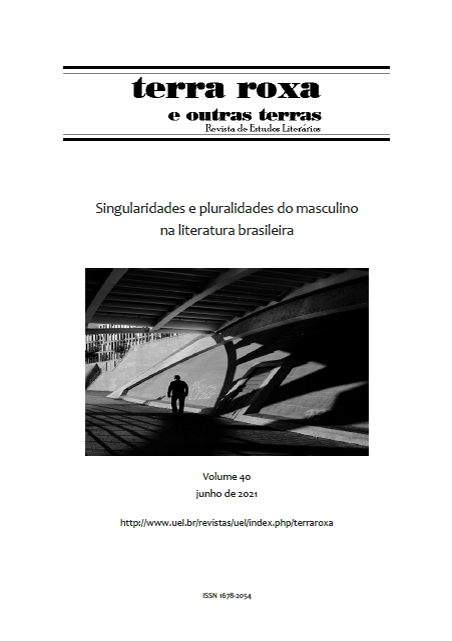Traces of masculinity in os prisioneiros, by Rubem Fonseca
DOI:
https://doi.org/10.5433/1678-2054.2021v40p44Keywords:
Rubem Fonseca, Masculinity, Os prisioneirosAbstract
This paper critically observes traces of masculinity used in identifying characters in four short stories from Os prisioneiros, by Rubem Fonseca: "Fevereiro ou março," "Duzentos e vinte e cinco gramas", "Teoria do consumo conspícuo" and "Henri". We seek to demonstrate both the recurrence of specific signs (sexual virility, physical strength, lack of control, aggressiveness, refinement, command, self-control, courage, and intellectuality) as well as the complexity and peculiarity with which they appear in each narrative, reiterating their understanding as performance acts. In turn, these features are continually displayed and repeated to make it appear, to other characters, that they would be spontaneous to attest their belonging to a privileged group. We were able to attest, however, that the signs of masculinity in the works represent, in fact, another way of imprisoning the characters, this being a central theme that crosses the various tales in the collection and that point to their resumption in the following works by Rubem Fonseca.Downloads
References
BOURDIEU, Pierre. A dominação masculina. Rio de Janeiro: Bertrand Brasil, 1999.
CONNELL, Raewyn. Gênero em termos reais. São Paulo: nVersos, 2016.
CORBIN, A., J-J. Courtine, e G. Vigarello. "Prefácio". História da Virilidade: a invenção da virilidade, da Antiguidade às Luzes. Petrópolis: Vozes, 2013. 7-9.
COURTINE, Jean-Jacques. "Robustez na cultura: mito viril e potência muscular". A. Corbin, J-J. Courtine, e G. Vigarello. História da Virilidade: a virilidade em crise?, séculos XX-XXI. Petrópolis: Vozes, 2013. 554-577.
FARIA, Alexandre. Literatura de subtração: a experiência urbana na ficção contemporânea. Rio de Janeiro: Papiro, 1999.
FONSECA, Rubem. Contos reunidos. São Paulo: Companhia das Letras, 1994.
HAROCHE, Claudine. "Antropologias da virilidade: o medo da impotência". A. Corbin, J-J. Courtine, e G. Vigarello. História da Virilidade: a virilidade em crise?, séculos XX-XXI. Petrópolis: Vozes, 2013. 15-34.
KALIFA, Dominique. "Virilidades criminosas?". A. Corbin, J-J. Courtine, e G. Vigarello. História da Virilidade: a virilidade em crise?, séculos XX-XXI. Petrópolis: Vozes, 2013. 302-331.
MACHADO, Lia Zanotta. "Masculinidades e violência: gênero e mal-estar na sociedade contemporânea". Mônica Raisa Schupun, org. Masculinidades, São Paulo: Boitempo, 2004.35-78.
SCHØLLHAMMER, Karl Erik. Ficção brasileira contemporânea. Rio de Janeiro: Civilização Brasileira, 2009.
SILVA JÚNIOR, Cloves da. Violência e poder sob as perspectivas de gênero, marginalização e vingança em contos de Rubem Fonseca. Dissertação (Mestrado em Letras e Linguística), Universidade Federal de Goiás, 2016.
STACUL, Juan Filipe. Masculinidades em crise: escrita, violência e (des)subjetivização em Feliz Ano Novo (1975) e Taxi Driver (1976). Tese (Doutorado em Letras), Pontifícia Universidade Católica de Minas Gerais, 2016.
VALE DE ALMEIDA, Miguel "Género, masculinidade e poder: revendo um acaso ao Sul de Portugal". Anuário antropológico, v. 95, p. 161-190, 1996.
Downloads
Published
How to Cite
Issue
Section
License
Copyright (c) 2021 Terra Roxa e outras Terras

This work is licensed under a Creative Commons Attribution 4.0 International License.
Authors who publish in this journal agree to the following terms:
a) The authors retain the copyright and grant the journal the right of first publication, the work being simultaneously licensed under the Creative Commons Attribution-NonCommercial 4.0 International License, allowing the sharing of the work with acknowledgment of the authorship of the work and initial publication in this journal.
b) Authors are authorized to assume additional contracts separately, for non-exclusive distribution of the version of the work published in this journal (eg, publish in an institutional repository or as a book chapter), with acknowledgment of authorship and initial publication in this journal.
c) Authors are allowed and encouraged to publish and distribute their work online (e.g. in institutional repositories or on their personal page) after the editorial process, as this can generate productive changes as well as increase impact and citation of the published work (See The Effect of Open Access).
d) The authors of the approved works authorize the journal to, after publication, transfer their content for reproduction in content indexers, virtual libraries and the like.
e) The authors assume that the texts submitted for publication are of their original creation, taking full responsibility for their content in case of any objection by third parties.




















